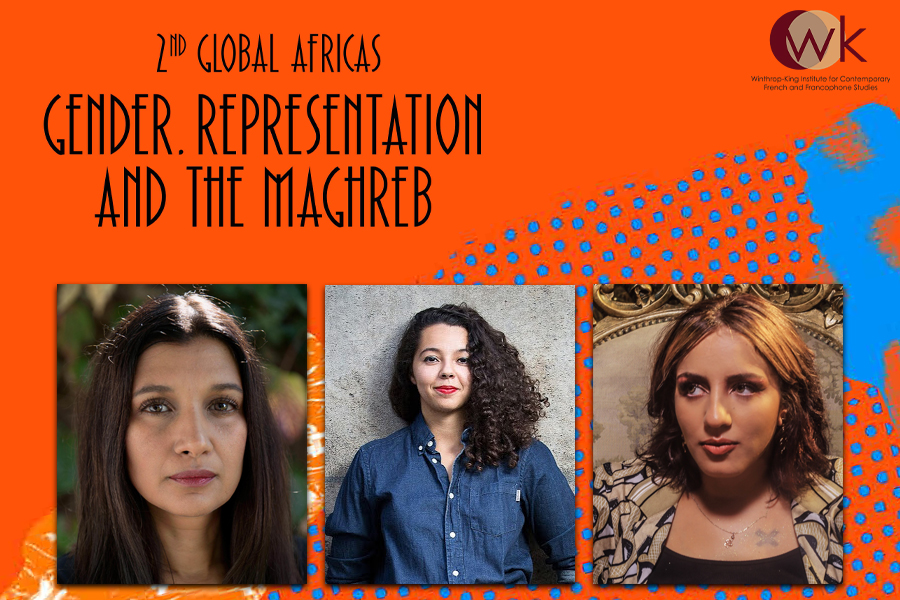
Florida State University’s Winthrop-King Institute for Contemporary French and Francophone Studies will welcome some of the 21st century’s most prominent voices for a two-day virtual symposium examining Africa’s past and present global interconnections, Thursday, Nov. 11, and Friday, Nov. 12.
“Gender, Representation and the Maghreb” explores the relationship between gender and representation in the northwestern portion of Africa that includes Algeria, Libya, Mauritania, Morocco, Tunisia and a large portion of the Sahara Desert. The Department of Modern Languages and Linguistics, the FSU Center for the Advancement of Human Rights and the FSU Middle East Center are co-sponsors of the event.
This event, the second iteration in the Global Africas series, includes virtual discussions and a roundtable that promotes a greater understanding of the richness and diversity of the French-speaking world. Participants will delve into the ways women from North Africa mobilize film, music and art to express themselves and to comment on and change the sociopolitical reality of contemporary life in this region.
Attendees will investigate these concepts through the work of three women from different fields: Tunisian filmmaker Raja Amari; Houda Abouz, also known as Moroccan rapper Khtek; and Moroccan artist Merieme Mesfioui.
“Through the streaming of two of Raja Amari’s films, conversations with each invited speaker, and a roundtable, this symposium also seeks to explore the global dimension and resonances of these women and their political and artistic work,” said Michelle Bumatay, series organizer and assistant professor of French at FSU.
The Winthrop-King Institute for Contemporary French and Francophone Studies’ Global Africas series works against the ubiquitous tendency to reduce Earth’s second-largest continent to a single nation by exploring the many ways in which Africa’s countries and peoples have always been globally interconnected.
The series examines the cultural, linguistic, political and historical realities of Francophone regions of Africa from a range of academic and artistic perspectives.
The events are free and open to the public, but advance registration is required via Eventbrite. Discussions will be conducted in English and French as indicated below. View the event website for full details, and contact Bumatay at mbumatay@fsu.edu with questions.
Events will include:
Thursday, Nov. 11
9 a.m., Discussion with Houda Abouz, also known as Moroccan rapper Khtek (in English)
12 p.m., Roundtable with Raja Amari, Houda Abouz and Merieme Mesfioui (session in English and French with English translations). Moderated by Michelle Bumatay; Zeina Schlenoff, director and adviser of FSU Middle Eastern Studies; and Terry Coonan, executive director of the FSU Center for the Advancement of Human Rights.
Friday, Nov. 12
10 a.m., Discussion with Raja Amari (session in French)
11 a.m., Discussion with Merieme Mesfioui (session in English)
About the speakers:
Raja Amari is a Tunisian filmmaker whose work often focuses on female protagonists and key political moments in Tunisia. Amari trained as a dancer and earned a degree in French literature from the University of Tunis before completing her studies in scriptwriting at La Fémis in Paris. Since 1998, she has made many short and feature-length films, including “Printemps Tunisien” and “She Had a Dream.”
Houda Abouz, known by her stage name Khtek, was named one of the BBC’s 100 Inspiring and Influential Women of 2020 for her quick rise to popularity in the male-dominated Moroccan rap scene. Rapping in a Moroccan Arabic dialect laced with phrases in French and English, Khtek presents social critiques by speaking to the reality of being a young woman in a patriarchal society while highlighting the generative and transformative potential of rap and hip-hop.
French-based illustrator, graphic designer and comic author Merieme Mesfioui’s work is unmistakably international in its scope and highly intimate in its articulation. She is originally from Morocco and combines traditional Moroccan patterns and Islamic art elements with graphic design to express female empowerment and in support of the LGBTQIA+ community’s rights, especially in North Africa and the Middle East. Mesfioui is also the co-founder of SPIN OFF, the Off Angoulême festival in France for underground comics and zines that have taken place since 2017.




